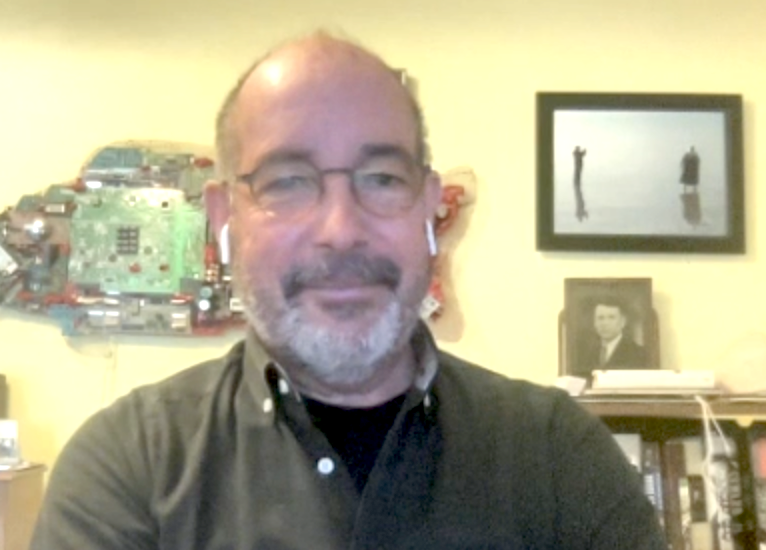
WASHINGTON — In courtroom 18 in the sterile D.C. federal courthouse, Justice Department prosecutors earlier this month tried nailing a major producer of adult pornography on obscenity charges.
The lawyers, part of the department’s Obscenity Prosecution Task Force, spent four days presenting their case against California porn producer John Stagliano (aka “Buttman”), who had been indicted in 2008, during the final year of the Bush administration. As part of their case, prosecutors even played pornographic videos with names like “Milk Nymph” for the jurors.
But before the defense could even present its side, U.S. District Judge Richard J. Leon dismissed the case, saying the government had failed to prove the most basic of issues: that the defendant and two related companies were linked to porno videos that the government claimed went beyond the acceptable community standards.
Adult film director John Stagliano arrives at the 27th annual Adult Video News Awards Show at the Palms Casino Resort January 9, 2010 in Las Vegas, Nevada.
Ethan Miller, Getty Images
A U.S. district judge earlier this month dismissed a case against porn producer John Stagliano, here at the Adult Video News Awards Show in Las Vegas in January.
The judge also raised questions about core issues in the case.
“I hope the government will learn a lesson from its experience,” declared Leon, who voiced concerns about the issues of obscenity statute, the Internet, free speech and criminal rights, according to The Washington Post. “I hope that [higher] courts and Congress will give greater guidance to judges in whose courtrooms these cases will be tried.”
With the disastrous outcome in the D.C. case, and the change from the conservative Bush administration to the liberal Obama regime, some now wonder how enthusiastic the Justice Department will be in going after adult pornography cases.
“That’s a big question,” says Penn State University professor Robert D. Richards, head of the Pennsylvania Center for the First Amendment. “How much the Obama administration will be interested in pursuing obscenity cases is questionable. It would certainly be hard pressed to pull full steam ahead. It’s not an easy area to prove.
“The real problem with obscenity is you never know if something is criminal until a jury comes back and says it’s criminal and it’s only in that jurisdiction,” he added.
Robert Peters, president of Morality in Media, who blames the FBI for “botching” the D.C. case, also wonders what will become of future prosecutions. He believes even the Bush administration fell far short of its expressed goals — and has far less confidence in the Obama administration.
“We can’t continue to treat [pornography] like a joke, which is largely how the FBI has treated it,” he said. “The FBI is simply unwilling to do these cases other than a token investigation here and there, and that’s not enough.
“Adult pornography has effects on marriages, effects on children and effects on women,” he continued. “The Supreme Court has held repeatedly the First Amendment does not protect obscene material.”
The FBI deferred to the Justice Department for comment. Justice spokeswoman Laura Sweeney declined comment on the D.C. trial or on future plans to prosecute obscenity cases.
A Shift in Priorities?
The dip in the number of cases has been noticeable during the Obama administration. According to the Justice Department, prosecutors charged about 360 defendants with obscenity violations during the Bush years, nearly double the number under Bill Clinton. In 2009, about 20 defendants were charged, compared with 54 the previous year, when George W. Bush was still in office.
After Bush took office, his conservative attorney general, John Ashcroft, vowed to go after obscenity cases involving adult pornography that violated “community standards.” In 2005, Ashcroft’s successor, Alberto Gonzales, took it up a notch, creating the Justice Department’s Obscenity Prosecution Task Force. The FBI also vowed to commit resources.
But the Bush people disappointed, according to Peters.
“Ashcroft failed,” he said. “[FBI Director] Bob Mueller failed and Alberto Gonzales failed. … They talked the talk and then they didn’t do it.”
Plus, he claimed, few U.S. attorneys’ offices around the country wanted to take on the cases, and even when they did, the FBI wouldn’t investigate.
Unquestionably there was skepticism within the ranks of the FBI and the Justice Department — and resistance — over the push to prosecute porn during the Bush years.
“I thought they were nuts,” said one former federal prosecutor in Washington. “And they would approach you about taking these cases, making it sound like it was a great honor. They had cases that were just [garbage].”
He said his office found ways to politely pass on prosecuting them. “Nobody liked the cases, nobody thought they accomplished anything,” he said. “They were true believers. They had a moral culture they wanted to push. It had nothing to do with enforcing the law.”
Brad Garrett, a former FBI agent in the Washington field office, said the obscenity cases were tough to prove since they were based on community standards. Plus, many agents questioned whether it was the best use of resources, particularly after Sept. 11, 2001.
“It really boiled down to priorities for most agents,” said Garrett, whose own accomplishments include nabbing a Pakistani national who gunned down two CIA employees at the agency’s headquarters in 1993. “You’ve got a limited number of people. Is it really the best use of our time to be investigating obscenity with consenting adults?”
Regardless, Allan B. Gelbard, one of the defense attorneys in the Stagliano case, said he expects the Justice Department to continue going after the cases so long as the same people are in the Obscenity Prosecution Task Force.
“It strikes me that this particular unit is so driven by ideology that they’ll probably go through [with more prosecutions] until they’re disbanded, and that can’t be too soon in my book,” he said. “They’re going to keep ruining peoples’ lives.”
The Case That Imploded
The indictment against Stagliano and two related companies, John Stagliano Inc. and Evil Angel Productions, came in April 2008, in the waning months of the Bush administration. In early July, the trial started. Things went poorly for the prosecution almost from the start.
For one, the FBI agent in the case copied from the Internet a trailer of a video — “Fetish Fanatic Chapter 5” — that had so many glitches, it failed to play properly for the jury. Consequently, the judge ruled it was inadmissible.
Then prosecutors, who had the porn DVDs shown as evidence shipped via a third party, failed to prove that Stagliano or either of the two companies had anything to do with the films or the shipping.
“It was a colossal disaster,” says Richards, the Penn State professor. “They never connected the dots, and that was fatal to the case.”
Peters of Morality in the Media has concerns about the Stagliano case, but for obviously different reasons.
“The FBI ought to be embarrassed — they blew it,” he said, adding that the FBI agent was either inexperienced or had inadequate resources.
Even after the Stagliano case, however, many in the adult entertainment industry have concerns about what direction the government will take on obscenity prosecutions.
Diane Duke, executive director of the California-based Free Speech Coalition, the industry’s trade association, said she is worried the government may continue filing what she sees as questionable charges against studios, aiming to bleed them to death through legal fees that can run upward of a million dollars.
“They know they’re going to do damage to our companies, no matter what,” she said. “I think there’s people in our government who respect freedom of speech and the Constitution, and it’s my hope those folks will prevail.”





